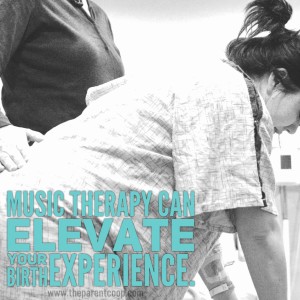Pain during childbirth is often the top concern of expectant mothers.
It doesn’t matter if you plan to have a drug-free birth, use any and all medication, or are having a cesarean birth, you have likely already thought about how it will feel and how to cope with the pain. We’ve seen the tv shows and movies, maybe even watched a birth video. I don’t know how it was for you, but some of that looked SCARY! How can women DO that?! When looking into your options for managing pain, you may hear many of the same suggestions: epidural, birth tub, visualization, etc.
These are all valid options for managing pain. But in addition to these more common approaches to pain, many studies have shown music therapy is an incredibly effective way to aid in pain management, and not only for those choosing a medication-free birth. In my own practice I’ve had medical professionals joke that morphine is good, music is good, and together they’re amazing.
Music can work hand-in-hand with any other options you may choose to manage your pain and can elevate your birth experience.
In the 1980s researchers began loooking at music therapy’s application in labor and delivery. In one of the early studies done, it was reported that music therapy intervention was effective in managing discomfort by 63%. Since then, the study of music for pain/discomfort relief or “audio analgesia” in music therapy has continued to grow. And while we see studies being done in many different areas, from cancer to dementia and beyond, the findings are easily applicable to labor and birth. Studies in 2010 and 2013 (and many more) have found that during medical procedures, music therapy assisted in not only a reduction in pain but also assistance with decreasing anxiety, regulating and lowering heart rate, and supporting respiratory rate.
Understanding how music can mitigate pain and anxiety is important!
It’s a common understanding that pain, tension and fear operate in a cycle. Pain is a physical feeling, but is also influenced and increased by both tension and fear. When we experience fear our body tenses. When we tense up, pain increases. So when fear and tension creep into labor, the pain of the contractions feel even more intense.
Intentional and clinical use of music has been shown to decrease heart rate, respiratory rate and blood pressure – in a word, RELAX. Studies also show that music reduces anxiety levels.
A board certified music therapist differs from “music medicine” or a prepackaged playlist of music because we are able to offer hands on physical support, we develop an ongoing therapeutic relationship, and we are trained to read your individual cues to best adjust and apply music therapy techniques to your unique experience.
Music reduces pain by breaking the cycle of fear and tension, no matter the birth experience.
Imagine you’re laboring on a birth ball. Your music therapist may be providing some counter pressure on your low back, sharing encouraging affirmations, and perhaps assisting in cueing deep cleansing breaths. Contractions are frequent and strong. You’re in active labor and your music therapist turns on a playlist that you both collaborated on during prenatal sessions. You’ve been listening to this music and practicing your labor positions for weeks. Now the music cues your breathing. Instead of the panting breaths of panic as you anticipate the pain of the next contraction, the music helps decrease your respiratory rate – you breathe slower, deeper, with the rhythm of the music. Your shoulders relax, your forehead unfurrows, your body opens for your baby to descend.
Or maybe you’re sitting on the edge of the bed as your anesthesiologist prepares to place your epidural. You want the relief and yet are nervous. Nervous of the needle, nervous of the next contraction, trying to figure out how you’ll sit still so they can complete the injection. You listen to the music you and your music therapist have prepared. You go back to the visualization you did in your prenatal session, thinking of affirmations you’ve memorized, the safe space you see in your mind’s eye. You relax and exhale the anxiety as your anesthesiologist places your epidural. The pain is still there, but your focus is on the music, not the pain, and the needle is out before you realize it.
Or maybe you’re having a scheduled cesarean birth. Your birth experience with your first born revealed that you have a heart anomaly that’s left you scared and hoping for a better experience with this birth. Sessions with your music therapist has helped you heal from your past experience and prepare for your second birth. She offers you nonjudgmental support for your planned cesarean birth. You work together on planning music for your baby’s birth from above that will mask the sounds of the operating room, help you keep a positive focus, and most importantly help your body maintain a steady heart rate. You go into this birth experience, supported, confident and empowered. You smile, relieved, as you hear the song you picked out for your baby to be born to and you hear your precious little one’s first cry.
Nonjudgmental support for the birth experience you choose.
Music is a powerful addition to many life experiences. Many expectant mothers will make playlists to take with them into labor. But a board certified music therapist is uniquely qualified to tailor your favorite music to your needs, know when to adjust the music to your stage of labor, and how to best use music to support you.
The Parent Coop provides board certified music therapists who have completed additional training in music therapy assisted child birth. For more information on this program of study please visit www.soundbirthingmusic.com.
